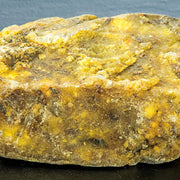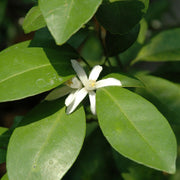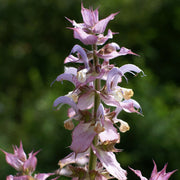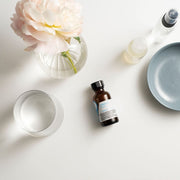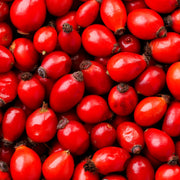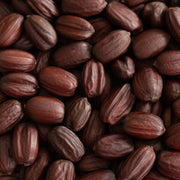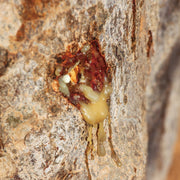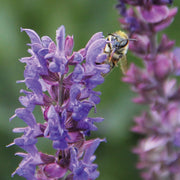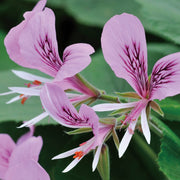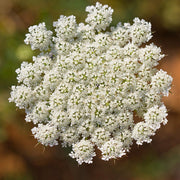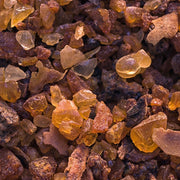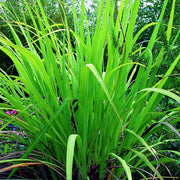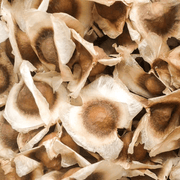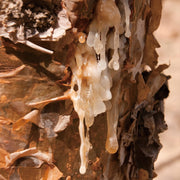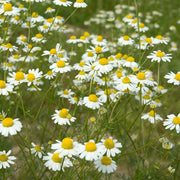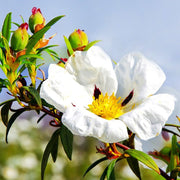In this post, I’ll take you step by step through how many and which products you really need for a complete skincare routine (it's less than 5!), and which ingredients can help you customize a routine for your specific skin type.
If you have acne-prone skin, combination skin, or oily skin, hop over to Part 1 of this skincare guide to find recommendations for your skin type. Part 1 also goes into more detail about making your own organic facial cleanser, skin toner, and natural moisturizer.
Here’s a quick summary of this article:
- 3-step organic skincare
- Safety and using essential oils for skincare
- Normal skincare
- Anti-aging skincare
- Sensitive skincare
Your 3-step process to organic skincare
Your skin may be your largest organ, but that doesn’t mean caring for it has to be complicated.
Skin basically wants to be kept clean, toned and moisturized.
That means your organic skincare routine can consist of:
- Facial Cleanser – Remove dirt, impurities, and dead skin so pores don’t become clogged, and skin can “breathe.”
- Skin Toner – Condition and tighten pores, so they don’t collect dirt or impurities and don’t produce too much oil.
- Natural Moisturizer – Replenish skin’s vital nutrients, essential fatty acids, and vitamins so it has the “building blocks” to keep itself healthy.
Before we get into which ingredients to use to make these products, let’s touch on something very important!
Safety and using essential oils for skincare
Essential oils can do so much to help protect, soothe, and even restore the skin… if you know how to use them safely.
Essential oils are highly concentrated. Safety is important if we’re going to experience therapeutic benefits without causing negative reactions (such as sensitization, phototoxic effects, or irritation).
Please don’t apply undiluted essential oils to your face (or anywhere on your skin).
I usually recommend using 3–6 drops of essential oil for every 1 oz (30 ml) of carrier. That’s a 0.5–1% dilution.
It may not seem like a lot of essential oil, but remember these are highly concentrated plant substances.

When you think about it from that perspective, it makes sense to use a low dilution. A single drop of essential oil can create powerful effects!
Even at this low dilution, remember to keep essential oils (and organic skincare containing them) away from your eyes and mucous membranes.
And one more safety note before we move on to specific ingredients for your skin…
If your skin says, “I don’t like this!” in response to a certain ingredient or product, please pay attention. There are plenty of nourishing, organic options to choose from, so do yourself the kindness of finding one you resonate with.
Now let’s go over some specific ingredients that will nourish your skin type!
You can click on each ingredient mentioned below to learn more about it.
DIY organic skincare for normal skin
5 essential oils for normal skin
Trust these five essential oils to keep your skin protected, and help it repair itself quickly when damage does occur. (It happens! Things like the sun, harsh weather, and environmental toxins can take a toll—even on healthy skin.)
Consider them your shields against issues like irritation, redness, fine lines, and wrinkles.
1. Lavender Essential Oil
Latin name: (Lavandula angustifolia)
Perhaps the most famous skincare essential oil of all! Lavender contains linalool and linalyl acetate, components known to help skin maintain peak health and beauty.
2. Elemi Essential Oil
Latin name: (Canarium luzonicum)
Steam distilled from a resin, elemi is helpful for small areas of skin damage. It’s excellent for restoring smoothness, an even tone, and for small scars.
3. Neroli/Petitgrain Essential Oil
Latin name: (Citrus aurantium var. amara)
The leaves and blossoms of Citrus aurantium are co-distilled to create this oil that contains lavender’s two main components. Great for cleansing skin’s surface!
4. Clary Sage Essential Oil
Latin name: (Salvia sclarea)
Clary sage also contains the two main components in lavender (linalool and linalyl acetate), and can help clarify and tone the complexion to reduce breakouts.
5. Rhododendron Essential Oil
Latin name: Rhododendron anthopogon)
At once energizing and calming, rhododendron helps activate skin’s natural repairing, restoring resources, while also soothing reactions to stress.
Notes:
- Dilute these essential oils at 0.5–1% or less (3–6 drops per 1 oz of product) in facial cleansers, skin toners, and natural moisturizers.
- Aloe Vera Gel and hydrosols are water-based ingredients. If you’re making a water-based product with no carrier oil in it, add Solubol (Dispersant) to keep the essential oils dispersed through the product and protect the skin.
3 carriers for normal skin
If your skin is “normal,” that means it’s well-balanced.
You need organic skincare that helps maintain that balance—keeping it moisturized, conditioned, and healthy.
These carrier oils do just that! They offer luxurious moisture that absorbs quickly.
Skin recognizes these carrier oils as “food.” They offer skin the building blocks it needs to keep itself healthy, strong, and resilient… so your skin stays balanced.
1. Rosehip Seed Oil
Latin name: (Rosa rubiginosa)
Rich in vitamins C and E, as well as essential fatty acids, rosehip seed oil helps protect skin from environmental damage such as sun, dehydration, and irritants.
2. Baobab Seed Oil
Latin name: (Adansonia digitata)
Infusing skin with moisture, calming irritation, and leaving pores open to breathe makes baobab seed oil great for normal skin.
3. Jojoba Oil
Latin name: (Simmondsia chinensis)
Jojoba is naturally balancing. It closely resembles the skin’s natural oil (sebum), so skin recognizes it easily and seems to drink it right in!
Notes:
- Use these carrier oils in a facial cleanser with aloe vera gel, Castile soap, or hydrosols.
- You can also use them alone, or blend them together to make natural moisturizer.
3 hydrosols for normal skin
These hydrosols strike the right balance of hydration and oil control.
They’re cooling and calming (for things like heat and redness), while also supporting the skin’s natural repair process. The result is a hydrated, toned, and glowing complexion—even on very hot or stressful days.
1. Myrrh Hydrosol
Latin name: (Commiphora myrrha)
Myrrh helps us find strength and peace. It brings this quality to organic skincare, building skin’s health from within so it stays resilient, supple, and glowing.
2. Hyssop Hydrosol
Latin name: (Hyssopus officinalis)
Hyssop hydrosol is multi-talented: it can clear away excess fluid (such as oil), while ensuring skin is well hydrated.
3. Rose Geranium Hydrosol
Latin name: (Rosa × damascena/Pelargonium × asperum)
Another multi-talented hydrosol, rose geranium seems to offer everything skin needs! One of its best gifts is soothing stressful reactions (for the emotions and skin).
Notes:
- Use these hydrosols in a facial cleanser with aloe vera gel, Castile soap, or a carrier oil.
- You can also use them alone, or blend them together, to make organic skin toner.
DIY organic skincare for anti-aging skin
5 essential oils for anti-aging skin
These essential oils for aging skin can help restore a fresh, supple, energized appearance.
On a deeper level, these oils work “behind the scenes” to encourage skin to repair itself, layer by layer.
They help you create organic skincare that targets issues like fine lines, wrinkles, a tired and lusterless complexion, redness, discoloration, and more.
1. Carrot Seed Essential Oil
Latin name: (Daucus carota)
Carrot seed essential oil is one of organic skincare’s most popular stars! It’s used to restore a beautiful complexion as it energizes the skin’s natural repair process.
2. Myrrh Essential Oil
Latin name: (Commiphora myrrha)
Protective and gentle, myrrh essential oil helps infuse tired skin with suppleness. Its sesquiterpene content gives it an affinity for reducing fine lines.
3. Palmarosa Essential Oil
Latin name: (Cymbopogon martinii var. motia)
Palmarosa is often used in organic skincare to help restore a smooth texture to anti-aging skin, as well as rebalancing healthy levels of natural moisture (sebum).
4. Helichrysum Essential Oil
Latin name: (Helichrysum italicum)
Also known as “everlasting” and “immortelle,” helichrysum essential oil is used to help repair vulnerable, compromised skin. Deeply rejuvenating for fine lines!
5. Rose Absolute Essential Oil
Latin name: (Rosa × damascena)
Rose absolute is a “must-have” for anti-aging organic skincare. It helps dry, depleted skin hold onto more nutrients and moisture.
3 carrier oils for anti-aging skin
Skin needs essential fatty acids to rejuvenate itself, but the body can’t produce them on its own.
Carrier oils offer those nutrients—as well as vitamins and luxurious moisture—to help replenish a depleted complexion, restoring a firm, supple texture.
I often include these carrier oils in organic skincare blends for targeting fine lines and wrinkles, helping skin repair itself, and infusing very dry, chapped skin with moisture.
They’re even great for discolored areas and scar care.
1. Avocado Oil
Latin name: (Persea gratissima)
Luxurious avocado oil penetrates the skin deeply to restore suppleness, moisture, and nutrients throughout its layers.
2. Moringa Oil
Latin name: (Moringa oleifera)
A thick, rich oil that contains over 84% oleic acid! Moringa oil helps repair the skin’s health and create a smooth texture.
3. Pomegranate Seed Oil
Latin name: (Punica granatum)
Pomegranate seed oil is incredible for anti-aging skin! It contains CLA, an Omega-5 fatty acid… and one of the strongest antioxidants we know of.
3 hydrosols for anti-aging skin
When the skin’s resources are depleted, it asks for support throughout the day—a regular flow of hydration and repair.
The hydrosols in this list give anti-aging skin a “drink.” They’re rich with soothing properties that help it stay energized, dewy, soft, and healthy. Germs aren’t attracted to these hydrosols, either… a big plus in organic skincare.
I love using these as cooling spritzes on hot summer days!
1. Frankincense Hydrosol
Latin name: (Boswellia carterii)
One of the most popular natural products for anti-aging skin! Use frankincense hydrosol to restore a soft texture, and create a clear, radiant complexion.
2. Rose Otto Damascena Hydrosol
Latin name: (Rosa × damascena)
Anti-Aging skin can feel delicate, papery, and dry. Rose hydrosol adds moisture and helps skin retain it, to restore strength and suppleness.
3. Helichrysum Hydrosol
Latin name: (Helichrysum italicum)
Repair and rejuvenation are helichrysum’s strongest talents! It helps energize aging skin’s natural repair process.
DIY organic skincare for sensitive skin
5 essential oils for sensitive skin
Sometimes it seems like sensitive skin can react to just about anything.
And essential oils are highly concentrated. Using the wrong ones for your skin could cause irritation.
I’ve selected extra-gentle essential oils for this list! These five oils have a special affinity for the skin, and aren’t known to cause reactions. (I often include them in blends for children.)
1. Carrot Seed Essential Oil
Latin name: (Daucus carota)
Carrot seed’s rich sesquiterpene and sesquiterpenol content contributes to its ability to gently, persistently even out skin’s complexion.
2. Frankincense Essential Oil
Latin name: (Boswellia carterii)
Frankincense is a champion of organic skin =care! It’s purifying to help reduce acne and encourages the skin to repair itself through and through.
3. German Chamomile Essential Oil
Latin name: (Matricaria recutita)
Does your skin feel irritated? Itchy? Sore and tender? German chamomile can help calm all of that down. Perfect for sensitive blemishes.
4. Roman Chamomile Essential Oil
Latin name: (Chamaemelum nobile)
Think of Roman chamomile like a lullaby for the skin. It can soothe redness and irritation as you go about your day. (It’s great in nighttime blends!)
5. Rock Rose Essential Oil
Latin name: (Cistus ladanifer)
If your skin reacts easily to irritants, rock rose essential oil can help. It’s comforting for immediate and ongoing issues… even old, lingering ones like scars.
3 carrier oils for sensitive skin
Sensitive skin asks for a tender touch.
Carrier oils for sensitive skin should be light and silky, and rich with essential fatty acids, vitamins, and nutrients that give your skin the resources to protect itself from irritants and restore itself quickly after any light damage.
Here are three deeply moisturizing carrier oils that sensitive skin can recognize as friendly and replenishing.
1. Argan Oil
Latin name: (Argania spinosa)
Argan oil offers vitamin E to help smooth and strengthen skin. It does not clog pores and is my first choice for nourishing and repairing sensitive skin.
2. Cranberry Seed Oil
Latin name: (Vaccinium macrocarpon)
Cranberry seed oil’s balanced ratio of Omega-6 and -3 fatty acids, as well as vitamin E content, make it deeply nurturing, and useful for cooling and calming irritation.
3. Rosehip Seed Oil
Latin name: (Rosa rubiginosa)
An excellent anti-aging carrier, rosehip seed oil is rich in vitamins C and E, as well as essential fatty acids. It helps restore complexion and suppleness.
3 hydrosols for sensitive skin
As you go about your day, your skin encounters all kinds of potential irritants… like the sun, wind, cold weather, pollution in the air, dehydration, and more.
Sensitive skin might even turn a bit red and uncomfortable if you eat something it doesn’t like!
Calm your skin with these hydrosols that soothe and gently moisturize.
1. German Chamomile Hydrosol
Latin name: (Matricaria recutita)
An ultra-soothing protector of sensitive skin! German chamomile is famous for its calming effects on all kinds of irritation and tenderness.
2. Calendula Hydrosol
Latin name: (Calendula officinalis)
Clarifying and cleansing, calendula hydrosol helps purify the skin’s surface while calming the appearance of red puffiness.
3. Comfrey Hydrosol
Latin name: (Symphytum officinalis)
Comfrey hydrosol moisturizes very dry, cracked skin, and gently strengthens its natural ability to repair itself. Perfect for fine lines, scars, and discolored areas.
I’d love to know how your organic skincare blends work for you!
If you make any of your own organic skincare using these ingredients, will you leave a comment and share your experience with me?
I’d love to know what’s working for you! Your comment could also help others who are making their own organic skincare and looking for insights.
Thank you!







